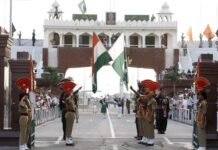A prose poem about the city of Srinagar. It grew as response to Louis Borges’s poem about his beloved city of Buenos Aires.
When his mother Sufia died in 1997, Agha Shahid Ali sung many elegies to the city until the city itself became an elegy. This poem, however, tries to catch the contemporary mood of Srinagar – Feroz Rather
By the River Jhelum, my window opens into the city of Srinagar at noon.It is a trellis window. Its wooden motifs are rhomboidal, our patient improvisations of what they were, many centuries ago, in Samarkand. Over the soldiers’ sand-bagged bunker and the tangles of wire, over the roof shingles of houseboats moored in the muddy water,it overlooks a road,dusty and strewn with stones,busy with life, the leisurely passage of buses.
The window fills with the clamor of the city centre, LalChowk, from the rear: honking of cars, shouts of bus conductors, of vendors selling lotus stems and water nuts, the jingle of bangles on the arms of women, hobnobbing of old men, whistles of the policemen on prowl.It listens in the songs of Habeh Khuton, sad and reminiscent of the color of saffron from Pamper, from the corner where you find late poems of Azad, fresh copies of Curfewed Night, fake pieces of Bombay music.
From the loudspeakers of the city, muezzins’ cries, now out of sync, now overlapping onto each other,call us for the Friday prayer. The window fills with the near breath of pear blossoms and gunpowder. It anticipates the throbbing rhythms of a maddening crowd.
The glasses tremble; stray dogs are barking frantically,the tear gas shells are exploding; the gunshots are ringing in the street leading to Old City. A horde of journalists comes fleeing to Press Colony; they are carrying the weight of the dead in their pockets.
She pulls out her notebook and looks at it. She tears off the page and flings it into the water. This city is going mad with freedom. He was killed near a pillar of Jama Masjid while throwing stones at them. I swear by my eyes, he looked like my younger brother and was no more than eleven.
Under the sky with gray Himalayan horizon, the road is desolate and no buses run. Beyond, in the blinding sun, poplar trees, Lorca’s teachers of breeze, stand mutely around Sufia Nishan. It is there that Shahidin the last years of the millennium wept elegies for Sufia, and the city wept with him until soaking in summer rains, it was an elegy.
At night, Shahid’s shadow hangs with the shadows of the boys over the seven bridges of the city.In my window, through the ridges of its broken glasses, I foresee: another shadow, another guardian of freedom, rising from the dust and stones, another shadow, watching over the elegiac soul of Srinagar now again in rebellion.















